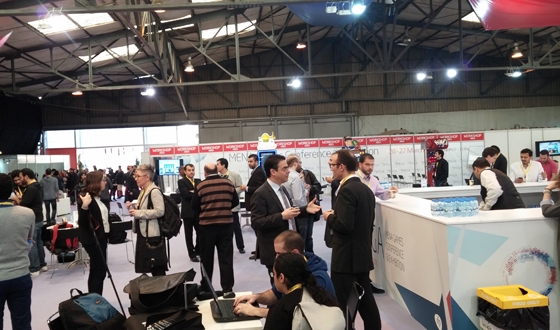Game developers in the region must cooperate and share data in order to increase production and reach a wider audience, an industry expert said.
“Sharing data among game developers would allow them to collect common patterns for all games including downloads and payment habits for all customers,” Joseph Shomali, co-founder and CEO of Play 3arabi, told The Daily Star.
“This would in turn help developers in producing games based on customers’ preferences which would increase their sales,” he added.
Shomali’s remarks came on the sidelines of the MENA Games Conference and Exhibition held Thursday in Mar Mikhael train station. The event, organized by IFP, features over 30 speakers and aims to create awareness among the MENA region’s investors and promote investment in the gaming industry.
Shomali said that one of the main challenges facing this industry in the Middle East is the lack of cooperation among game developers.
“Our problem in the region is that we think we are bigger than who we are as companies and we act in a very competitive way,” he said.
“But in fact we should cooperate together because the pie is so big and we must all work together if we want to succeed.”
Shomali’s remarks were echoed by Abdullah Hamed, CEO of Lumba Games, who spoke during the first session of the conference titled “Developing games for the MENA region. Hamed said sharing data was important but hard to do. “It is really hard to share data with small companies, especially startups, because their boards of directors tend to raise the value of their companies and information and they do not give any data for free,” he added.
The first session of the conference also featured other speakers from the region who voiced their concerns about challenges facing the gaming industry.
Speakers agreed that one major struggle facing games developers is the challenge of producing content that is suitable for the culture of the targeted region.
“Game developers must be able to understand the culture of the region in a bid to produce suitable content,” said Houssam Hammo, CEO of Tamatem Games.
“If I am to produce a game targeting this region then it should be produced locally even if the code itself is produced in a more developed part of the world,” he added.
Hamed agreed it was important to have people who are familiar with the local market to advise you on what works and what does not.
Other speakers emphasized the need to produce games that are compatible with the infrastructure and market needs of each country.
“For instance the quality of games that one publishes in Egypt won’t be accepted in Saudi Arabia,” said Baris Ozistek, CEO of Netmarble EMEA.
Ozistek added that high-quality games are easier to distribute in Saudi Arabia, the UAE and Qatar because they have high quality content and they need greater broadband capacity to be downloaded.
Meanwhile, Shomali said the production of high quality games would facilitate their marketing all over the world. “But quality is not the only necessary factor to facilitate marketing,” he said. “We need to build partnerships in different countries for us to be able to export our games to these places.”
“If I want to send a game to the Turkish market, for instance, I need a partner there,” he added.
Experts had different opinions on the importance of funding when it comes to producing new games in the region. “I would say funding is very important to improve this industry in the region,” said Hammo. “If we do not secure funding for this industry we will see companies leaving the market,” he added.
But for Shomali, money is not an issue. “When companies cooperate together they will achieve more success and funding will come automatically,” he said.
The Daily Star
29 March










































































